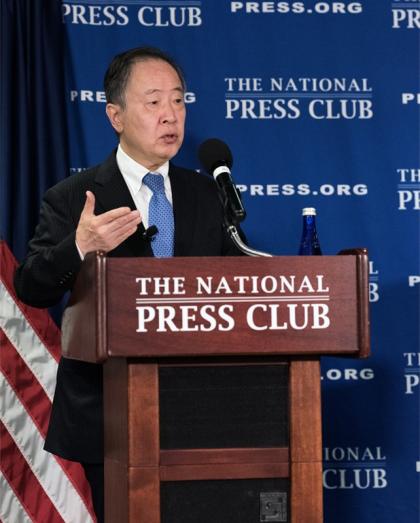Japan-US collaboration is vital in tackling global issues, Ambassador Tomita says
Ahead of the G-7 Summit that begins May 19, Japan’s ambassador to the U.S., Koji Tomita, visited the National Press Club for a Headliners Newsmaker to highlight key issues expected to be discussed at the meeting of global leaders in Hiroshima.
The summit that brings together representatives of seven of the largest advanced economies around the world, including the United States, comes as concerned national leaders grapple with “Russia’s aggression” toward Ukraine and ever-changing international dynamics.

Tomita discussed the pressing need to focus on the “strengthening of a free international order.”
“There will be civil priorities, including, of course, Ukraine, and expect in the years to come to demonstrate a renewed commitment to justice and peace in their country,” Tomita said at the Tuesday, May 9, briefing.
Tomita, who is on his second diplomatic tour to the United States, expects talks to continue about reviving the battle-riddled country. “They will certainly discuss the continuation of very robust support extended to Ukraine, including in the area of reconstruction, rehabilitation, and also, I think they’re going to discuss how to maintain robust measures taken against Russia,” making sure the effective ones remain in place.
The ambassador wishes to get ahead of artificial intelligence, also known as AI, by “building a better governance for transformative technologies . . . or digital technology.”
Another focus at the G-7 Summit will be how to engage with the Global South, countries outside the Western Hemisphere, often referred to as third-world countries. Those regions are found in Africa, Asia, Latin America and Oceania.
“Those groups of countries that they need help and . . . need to be supported by the broader global community,” he said.
“I think it is important for G-7 countries to reach out to those countries,” Tomita said. But “that reaching out and preaching, you know, values and principles, is not enough.”
“I think the engagement needs to be accompanied by [certain concrete] actions to bring tangible benefits to the Global South, particularly in the context of various global challenges,” he added.
With climate change now a hot-button issue, Tomita acknowledged the need for action “to mobilize resources for the huge infrastructure needs.”
“So they must be diverse outward towards climate. And as far as the demographic country is concerned, I think that we need support for energy transition,” Tomita said. “And also worldwide, I think we need to ensure [a] resilient supply chain in the energy sector as well.”
It's essential that the G-7 discuss health care for all in the coming days, he said. “Health remains very important. We have to continue to push for universal health coverage as well.” He also said analyzing the response to the COVID-19 pandemic would be beneficial for mapping how to respond to future pandemics.
Tomita noted that while the G-7 includes more nations, there is significance in the collaboration between the U.S. and Japan in the pursuit of change.
“'The importance of these Japan-U.S. relationships. . . . For Japan, this partnership is critical in so many issues that I have discussed today,” he concluded. “So, all in all, I’m very much looking forward to productive outcomes [in] Hiroshima.”
